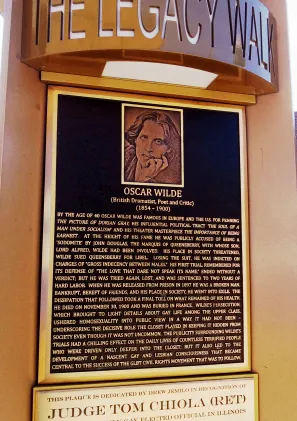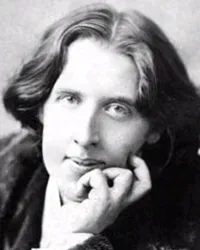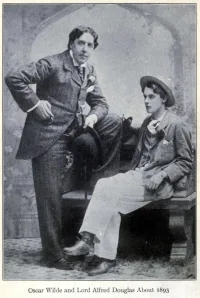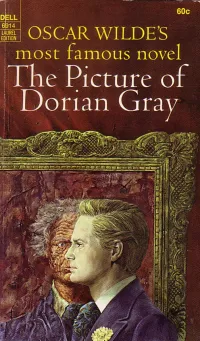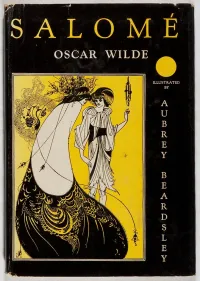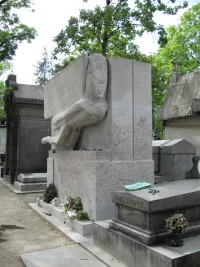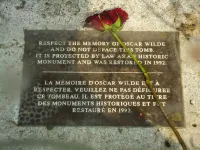Plaque Sponsor
Drew Jemilo in recognition of Judge Tom Chiola (Ret.) the first openly gay elected official in IllinoisBiography
1854 - 1900
"Always forgive your enemies - nothing annoys them so much."
- Oscar Wilde
By the age of 40 Oscar Wilde was famous in Europe and the U.S. for penning The Picture of Dorian Gray, his influential political tract The Soul of a Man Under Socialism and his theater masterpiece The Importance of Being Earnest. At the height of his fame he was publicly accused of being a ‘sodomite’ by John Douglas, the Marquis of Queensberry, with whose son, Lord Alfred, Wilde had been involved. His place in society threatened, Wilde sued Queensberry for libel. Losing the suit, he was indicted on charges of “gross indecency between males.” His first trial, remembered for its defense of “the love that dare not speak its name,” ended without a verdict; but he was tried again, lost, and was sentenced to two years at hard labor. When he was released from prison in 1897 he was a broken man. Bankrupt, bereft of friends, and his place in society, he went into exile. The dissipation that followed took a final toll on what remained of his health. He died on November 30, 1900 and was buried in France. Wilde’s persecution, which brought to light details about gay life among the upper class long kept hidden, ushered homosexuality into public view in a way it had not been – underscoring the decisive role the closet played in keeping it hidden from society even though it was not uncommon. The publicity surrounding Wilde’s trials had a chilling effect on the daily lives of countless terrified people who were driven only deeper into the closet; but it also led to the development of a nascent gay and lesbian consciousness that became central to the success of the GLBT Civil Rights Movement that was to follow.
1854 - 1900
"Always forgive your enemies - nothing annoys them so much."
- Oscar Wilde
By the age of 40 Oscar Wilde was famous in Europe and the U.S. for penning The Picture of Dorian Gray, his influential political tract The Soul of a Man Under Socialism and his theater masterpiece The Importance of Being Earnest. At the height of his fame he was publicly accused of being a ‘sodomite’ by John Douglas, the Marquis of Queensberry, with whose son, Lord Alfred, Wilde had been involved. His place in society threatened, Wilde sued Queensberry for libel. Losing the suit, he was indicted on charges of “gross indecency between males.” His first trial, remembered for its defense of “the love that dare not speak its name,” ended without a verdict; but he was tried again, lost, and was sentenced to two years at hard labor. When he was released from prison in 1897 he was a broken man. Bankrupt, bereft of friends, and his place in society, he went into exile. The dissipation that followed took a final toll on what remained of his health. He died on November 30, 1900 and was buried in France. Wilde’s persecution, which brought to light details about gay life among the upper class long kept hidden, ushered homosexuality into public view in a way it had not been – underscoring the decisive role the closet played in keeping it hidden from society even though it was not uncommon. The publicity surrounding Wilde’s trials had a chilling effect on the daily lives of countless terrified people who were driven only deeper into the closet; but it also led to the development of a nascent gay and lesbian consciousness that became central to the success of the GLBT Civil Rights Movement that was to follow.
Lesson Plan
Please login or register for an account to view this lesson plan.
Demography
Demography
Gender Male
Sexual Orientation Gay
Gender Identity Cisgender
Ethnicity Caucasian/White
Faith Construct Catholic Protestant
Nations Affiliated France Ireland United Kingdom United States
Era/Epoch Victorian Era (1837-1901)
Field(s) of Contribution
Advocacy & Activism
Art, Music, Literature & Theater
Author
Editor
Journalism
Media & Communications
Poet
Social Justice
Social Sciences
Theater
World History
Commemorations & Honors
Trinity College's Berkeley Gold Medal (1874)
Newdigate Prize for his Poem Ravenna (1878)
Sublime Degree of Master Mason While at Oxford (1874-1878)
Oscar Wilde Memorial Sculpture in Merrion Square Dublin, Ireland (1997)
Google Doodle Commemorating Wilde's 156th Birthday (2010)
Inaugural San Francisco Rainbow Honor Walk Honoree (2014)
Posthumous Pardon Under the Policing and Crime Act aka The Alan Turing Law (2017)
Demography
Gender Male
Sexual Orientation Gay
Gender Identity Cisgender
Ethnicity Caucasian/White
Faith Construct Catholic Protestant
Nations Affiliated France Ireland United Kingdom United States
Era/Epoch Victorian Era (1837-1901)
Field(s) of Contribution
Advocacy & Activism
Art, Music, Literature & Theater
Author
Editor
Journalism
Media & Communications
Poet
Social Justice
Social Sciences
Theater
World History
Commemorations & Honors
Trinity College's Berkeley Gold Medal (1874)
Newdigate Prize for his Poem Ravenna (1878)
Sublime Degree of Master Mason While at Oxford (1874-1878)
Oscar Wilde Memorial Sculpture in Merrion Square Dublin, Ireland (1997)
Google Doodle Commemorating Wilde's 156th Birthday (2010)
Inaugural San Francisco Rainbow Honor Walk Honoree (2014)
Posthumous Pardon Under the Policing and Crime Act aka The Alan Turing Law (2017)
Resources
Resources
Cohen, Ed. Talk on the Wilde Side: Toward a Genealogy of Discourse on Male Sexualities. New York: Routledge, 1993.
Cohen, Philip K. The Moral Vision of Oscar Wilde. Rutherford, N.J.: Fairleigh Dickinson University Press, 1978.
Cohen, William A. "Willie and Wilde: Reading The Portrait of Mr. W.H." South Atlantic Quarterly 88 (1989): 219-245.
Ellmann, Richard. Oscar Wilde. New York: Viking, 1987.
Freedman, Jonathan, ed. Oscar Wilde: A Collection of Critical Essays. Englewood Cliffs, N.J.: Prentice-Hall, 1969.
Foldy, Michael S. The Trials of Oscar Wilde: Deviance, Morality, and Late-Victorian Society. New Haven: Yale University Press, 1997.
Gagnier, Reginia. Idylls of the Marketplace: Oscar Wilde and the Victorian Public. Stanford: Stanford University Press, 1986.
Holland, Merlin. The Real Trial of Oscar Wilde. New York: Harper Perennial, 2004.
Hyde, H. Montgomery. Oscar Wilde. London: Eyre Methuen, 1975. (reprint by Penguin Books 2001)
McKenna, Neil. The Secret Life of Oscar Wilde. U.K.: Random House, 2003.
Nassaar, Christopher S. Into the Demon Universe: A Literary Exploration of Oscar Wilde. New Haven: Yale University Press, 1974.
Nunokawa, Jeff and Sickels, Amy. Oscar Wilde. New York: Chelsea House, 2005..
Oates, Joyce Carol. "The Picture of Dorian Gray: Wilde's Parable of the Fall." Critical Inquiry 7 (1980): 419-428.
Pearce, Joseph. The Unmasking of Oscar Wilde. San Francisco: Ignatius Press, 2004.
Powys, John Cowper. "Wilde as a Symbolic Figure." Oscar Wilde: The Critical Heritage. Karl Beckson, ed. London: Routledge & Kegan Paul, 1970. 357.
Robins, Ashley H. Oscar Wilde - The Great Drama of His Life: How His Tragedy Reflected His Personality. Portland, OR: Sussex Academic Press, 2011.
Sinfield, Alan. The Wilde Century: Effeminacy, Oscar Wilde, and the Queer Movement. London: Cassell, 1994.
Summers, Claude J. Gay Fictions: Wilde to Stonewall. New York: Continuum, 1990.
"Writing Gone Wilde: Homoerotic Desire in the Closet of Representation." PMLA 102 (1987): 801-813.
Woodcock, George. The Paradox of Oscar Wilde. New York: Macmillan, 1950.
http://rictornorton.co.uk/wildelet.htm
https://www.biography.com/people/oscar-wilde-9531078
http://www.thedailybeast.com/adventures-in-gay-history-with-oscar-wilde
Resources
Cohen, Ed. Talk on the Wilde Side: Toward a Genealogy of Discourse on Male Sexualities. New York: Routledge, 1993.
Cohen, Philip K. The Moral Vision of Oscar Wilde. Rutherford, N.J.: Fairleigh Dickinson University Press, 1978.
Cohen, William A. "Willie and Wilde: Reading The Portrait of Mr. W.H." South Atlantic Quarterly 88 (1989): 219-245.
Ellmann, Richard. Oscar Wilde. New York: Viking, 1987.
Freedman, Jonathan, ed. Oscar Wilde: A Collection of Critical Essays. Englewood Cliffs, N.J.: Prentice-Hall, 1969.
Foldy, Michael S. The Trials of Oscar Wilde: Deviance, Morality, and Late-Victorian Society. New Haven: Yale University Press, 1997.
Gagnier, Reginia. Idylls of the Marketplace: Oscar Wilde and the Victorian Public. Stanford: Stanford University Press, 1986.
Holland, Merlin. The Real Trial of Oscar Wilde. New York: Harper Perennial, 2004.
Hyde, H. Montgomery. Oscar Wilde. London: Eyre Methuen, 1975. (reprint by Penguin Books 2001)
McKenna, Neil. The Secret Life of Oscar Wilde. U.K.: Random House, 2003.
Nassaar, Christopher S. Into the Demon Universe: A Literary Exploration of Oscar Wilde. New Haven: Yale University Press, 1974.
Nunokawa, Jeff and Sickels, Amy. Oscar Wilde. New York: Chelsea House, 2005..
Oates, Joyce Carol. "The Picture of Dorian Gray: Wilde's Parable of the Fall." Critical Inquiry 7 (1980): 419-428.
Pearce, Joseph. The Unmasking of Oscar Wilde. San Francisco: Ignatius Press, 2004.
Powys, John Cowper. "Wilde as a Symbolic Figure." Oscar Wilde: The Critical Heritage. Karl Beckson, ed. London: Routledge & Kegan Paul, 1970. 357.
Robins, Ashley H. Oscar Wilde - The Great Drama of His Life: How His Tragedy Reflected His Personality. Portland, OR: Sussex Academic Press, 2011.
Sinfield, Alan. The Wilde Century: Effeminacy, Oscar Wilde, and the Queer Movement. London: Cassell, 1994.
Summers, Claude J. Gay Fictions: Wilde to Stonewall. New York: Continuum, 1990.
"Writing Gone Wilde: Homoerotic Desire in the Closet of Representation." PMLA 102 (1987): 801-813.
Woodcock, George. The Paradox of Oscar Wilde. New York: Macmillan, 1950.
http://rictornorton.co.uk/wildelet.htm
https://www.biography.com/people/oscar-wilde-9531078
http://www.thedailybeast.com/adventures-in-gay-history-with-oscar-wilde
